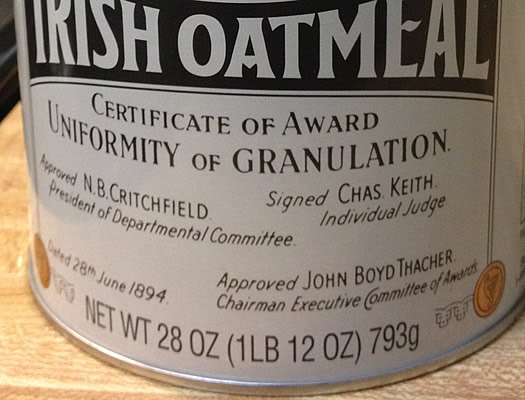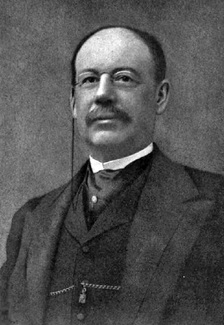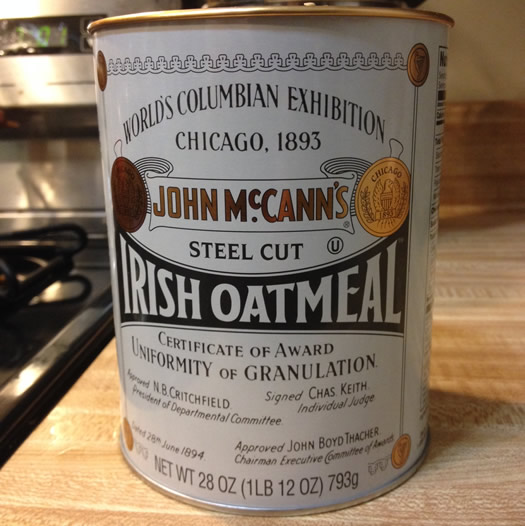Why is there a mayor on my oatmeal?

Sometimes we end up with odd legacies.
Speaking of Albany mayors and their representations on food, Barry T emails with the photo above:
Why is my oatmeal approved by John Boyd Thacher??
And to Barry, we say: That is a totally reasonable question.
First things first, for those not in the know (not you, of course, but someone): Who is John Boyd Thacher?
 JBT was mayor of Albany not once, but twice -- from 1886-1888, and then again from 1896-1897. The name should be familiar -- the history of Albany has been thoroughly Thacher'ed:
JBT was mayor of Albany not once, but twice -- from 1886-1888, and then again from 1896-1897. The name should be familiar -- the history of Albany has been thoroughly Thacher'ed:
+ JBT's father, George Hornell Thacher, was mayor of Albany not once, not twice, but three separate times between 1860 and 1874.
+ JBT's nephew (the grandson of GHT) -- John Boyd Thacher II -- was also mayor, from 1926 to 1940 (he was the last elected mayor before Erastus Corning II's reign).
+ In addition to the mayoring, John Boyd Thacher is also remembered for the eponymous state park, the land for which was donated by his widow, Emma Treadwell Thacher.
+ And the Albany Rural Cemetery is loaded with Thachers.
OK, so if we were talking about something Albany-related, the Thacher imprint would make sense. But Irish oatmeal?
The clue is the banner at the top of the can: "World's Columbian Exhibition, Chicago, 1893" -- AKA, the Chicago World's Fair. New York was among the states represented at the fair -- "New York State's Building ranks in size next to that of Illinois and California" -- and JBT was a member of the Empire State's board of commissioners for the event. He's listed in the program as "John Boyd Thatcher, Albany." (Yep, people have been misspelling his name for more than a century.)
The inclusion of Thacher (no second "t") makes sense. He was part of a connected political family, had run the family's railroad car wheel works, and he was a rather serious history nerd (he'd later go on to write books about Christopher Columbus and other history topics).
Ahead of the fair, in 1890, then-President Benjamin Harrison also appointed JBT to head up the standing committee on awards:
The committee recommends that awards shall be granted upon specific points of excellence or advancement, formulated in words, by a board of judges or examiners, who shall be competent experts; and the evidence of these awards shall be parchment certificates, accompanied by bronze medals.
The awards of these boards of judges or examiners will thus constitute an enduring and historical record of the development and progress as represented by the exhibits in question; the parchment certificate will, by sufficient terms of identification, evidence the award, and the bronze medal will serve to the exhibitor as an enduring memento of his success.

Check out the large medal on the upper middle-right portion of the can.
John McCann and his oatmeal -- from Drogheda, Ireland -- were at the fair as an agricultural representative of Great Britain (Ireland would get independence in 1921). And apparently his oatmeal -- with its "uniformity of granulation" and long history -- were judged to be a specific point of excellence. The medal is depicted on the label. Little says "development and progress" like oatmeal that cooks evenly because its grains are the same size.
We're guessing John Boyd Thacher enjoyed his time as an official with the Chicago World's Fair. In 1894, after the multi-month event ended, JBT wrote to the judges requesting portraits and biographies. A collection of those images and bios are part of an archive at the Library Congress.
After the fair, Thacher once again became mayor of Albany. And he was briefly the Democratic candidate for governor of New York in 1896. He got into a fight with Tammany Hall over his support for the gold standard following the Democratic convention in Chicago at which the party supported William Jennings Bryan and a free silver plank in its platform (a WJB ally ran Tammany Hall). He ended up dropping out of the race. A piece in the New York Times in September of that year -- which notes that Thacher had not concealed his ambition for the governorship "ever since he closed his curious service as Chairman of the Commission of Awards at Chicago" -- paints JBT as a disingenuous flip-flopper on the gold issue, declaring: "Today for the first time it can be positively said that John Boyd Thacher will never be the Governor of the State of New York."
And he never was. He had to settle for being mayor of Albany (again), poring over his collection of approximately 23,000 autographs ("said to be one of the most valuable and extensive in the world"), an eponymous (if posthumous) and beautiful park -- and his name on cans of oatmeal in supermarkets more than a century later.
Earlier on AOA:
+ Thacher Park's namesake
+ That zesty Kosciuszko
Thacher portrait via Wikipedia
Say Something!
We'd really like you to take part in the conversation here at All Over Albany. But we do have a few rules here. Don't worry, they're easy. The first: be kind. The second: treat everyone else with the same respect you'd like to see in return. Cool? Great, post away. Comments are moderated so it might take a little while for your comment to show up. Thanks for being patient.
Comments
Wow, am I disappointed I didn't discover this. Great job, AOA.
... said Carl on Nov 6, 2013 at 11:05 PM | link
My gosh that is a handsome looking can. And its contents, what uniformity of granulation! No wonder John Boyd Thacher approved.
... said D on Nov 6, 2013 at 11:32 PM | link
This was awesome, thanks for the morning dose of local history nerdiness.
... said laiskiainen on Nov 7, 2013 at 8:29 AM | link
This is excellent! Thanks for digging this story up,
... said Jen G on Nov 7, 2013 at 8:52 AM | link
Holy History Nerd! This is an amazing bit of local history sleuthing to wake up to on a wet, cold morning. And I've looked at that can of McCann's for eons and NEVER saw the Thacher name.
More whole grain nerditude:
By 1893 (year of McCann's award) steel-cut oats (also called "pinhead oats") such as this were getting competition from a new fangled form of oat cereal -- rolled oats, introduced by Quaker nationally in 1882. A rolled oat is the oat groat (whole grain or berry) steamed to soften it, then mechanically rolled, and then sliced into the regular, thick, or thin/quick cooking dimension. It was faster to cook than steel-cut and ultimately became the winner in oatmeal sales. Rolled oats was a form of fast food, relatively speaking.
Until recently I thought Irish and Scottish oatmeal were the same, with different national appellations. But I visited the Bob's Red Mill plant outside Portand, OR, last year and learned that while Irish oatmeal is steel-cut (such as McCann's), Scottish oatmeal is ground and more literally an oat-meal. Cooks up less gritty and more like porridge.
When I've got the time, it's Irish/steel-cut for me for its great taste and texture.
... said chrisck on Nov 7, 2013 at 9:29 AM | link
This is why I love AOA. Thank you.
... said Barry T on Nov 7, 2013 at 10:41 AM | link
One of the best things I've read all month. Thanks! I am passing this on to our local historical societies.
... said Susan D'Entremont on Nov 7, 2013 at 10:59 AM | link
Kathy Sheehan may be the first woman to serve as mayor of Albany, but will we ever see he name on a can of oatmeal?
... said Rob on Nov 7, 2013 at 11:20 AM | link
Someday, I expect to see the following on a container of Coppertone® Sunscreen:
Certificate of Award
Uniformity of Coverage
Approved Gerald "Jerry" Jennings
Chairman Executive Committee of Awards
... said Bob on Nov 7, 2013 at 12:39 PM | link
This makes me so happy. Thank you.
... said innae on Nov 7, 2013 at 5:05 PM | link
A great discovery of Albany's hidden trivia......it ranks right up there with our invention of perforated toilet paper and patenting of hinged caskets. Keep up the good work! Jack McE.
... said Jack McEneny on Nov 7, 2013 at 5:23 PM | link
And where did I first have McCann's? In Ireland!
... said Kathleen on Nov 8, 2013 at 4:11 PM | link